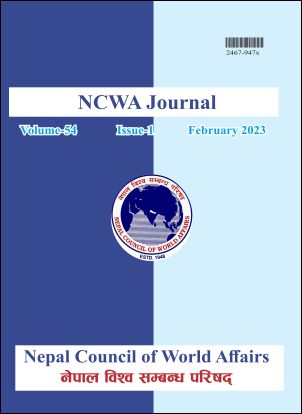Nepal’s Development Diplomacy: Road to Prosperity
DOI:
https://doi.org/10.3126/ncwaj.v54i1.54909Keywords:
land-lockedness, least developed status, coordination, line ministriesAbstract
Development diplomacy is crucial to the land-locked and least developed Nepal’s progress and prosperity. It has been more than seven decades since Nepal liberated itself from 104-year-old family autocracy and ushered in democratic rule. Ever since Nepal was admitted to the United Nations in 1955, land-locked Nepal has been categorized as one of the least developed among developing countries (LDCs). Hopefully, Nepal will graduate from LDC status by 2026. The country, faced with numerous development challenges, is effortful in overcoming them through internal policies and programs as well as international cooperation for development. Development diplomacy received priority attention following the restoration of parliamentary democracy in 1990. While the country’s land-locked ness, a geographical disadvantage, cannot be wished away, several task forces set up to recommend measures for the effective and efficient conduct of development diplomacy have identified trade, investment, tourism, foreign employment, and water resource development as major components of such diplomacy. The paper emphasizes the need for Nepal’s diplomatic missions abroad to be actively involved in promoting the country’s economic interests and facilitating all-round development through coordination and regular communication with the government’s line ministries including the Ministry of Foreign Affairs (MoFA), National Planning Commission, and the private sector.




